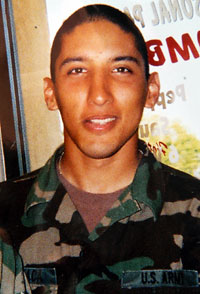The two soldiers disappeared after an insurgent attack at a checkpoint by a
Euphrates River canal, 12 miles south of Baghdad. Spc. David J. Babineau, 25, of
Springfield, Mass., was killed in the attack. The three men were assigned to the
1st Battalion, 502nd Infantry Regiment, 2nd Brigade, 101st Airborne Division
from Fort Campbell, Ky.

US Army Pfc.
Kristian Menchaca is shown in this undated family photograph. Menchaca is
one of the two US soldiers found dead after they became missing on
Friday at a checkpoint in Yusufiya, a town in an area south of Baghdad.
[Reuters] |
Caldwell said only a single vehicle
carrying the three US soldiers was attacked. A witness has said two other
Humvees were in the area and went after the assailants, while seven masked
gunmen ambushed the third Humvee.
Some 8,000 Iraqi and US troops searched for the missing soldiers. One US
soldier died and 12 were wounded during the search, Caldwell said, adding that
coalition troops killed two insurgents and detained 78. The troops received 66
tips, 18 of which were considered worthy of follow up.
The Mujahedeen Shura Council, an umbrella organization of five insurgent
groups led by al-Qaida in Iraq, posted an Internet statement Monday claiming it
was holding the American soldiers captive and that "we shall give you more
details about the incident in the next few days, God willing."
On Tuesday, after Iraqi officials disclosed that the bodies were found, the
Shura Council posted another Web statement, saying al-Zarqawi's successor had
"slaughtered" the soldiers. The language in the statement, which could not be
authenticated, suggested the group was saying the men were beheaded.
"With God Almighty's blessing, Abu Hamza al-Muhajer carried out the verdict
of the Islamic court" calling for the soldiers' slaying, the statement said.
The US military has identified al-Muhajer as an Egyptian associate of
al-Zarqawi also known as Abu Ayyub al-Masri. If confirmed, the killings would be
the first acts of violence attributed to al-Muhajer since he was named the new
leader of al-Qaida in Iraq in a June 12 Web message by the group.
Al-Zarqawi made al-Qaida in Iraq notorious for beheadings and was believed
to have killed two American captives himself, Nicholas Berg in April 2004 and
Eugene Armstrong in September 2004. A dozen Americans are still missing in Iraq,
Caldwell said.
Just hours before Tucker and Menchaca disappeared Friday, a US airstrike
killed a key al-Qaida in Iraq leader described as the group's "religious emir,"
Caldwell said.
Mansour Suleiman Mansour Khalifi al-Mashhadani, or Sheik Mansour, died along
with two foreign fighters in the same area where the soldiers' bodies were
found. The three were trying to flee in a vehicle.
Al-Mashhadani, identified as an Iraqi in his late 30s, was "a key leader of
al-Qaida in Iraq, with excellent religious, military and leadership credentials"
and tied to the senior leadership, including al-Zarqawi and his alleged
replacement, Caldwell said.
US forces captured Mansour in July 2004 because of his ties to the militant
groups Ansar al-Islam and Ansar al-Sunna, but the military let him go because he
was not deemed an important terror figure at the time.
Tuesday's violence across Iraq included at least three bombs striking Baghdad
despite a security crackdown launched nearly a week ago.
In the bombing of the home for the elderly, an 18-year-old Sunni wearing an
explosives belt blew himself up as senior citizens were lined up to collect
monthly pensions. Two elderly women were killed and three people were wounded.
Police said the motive was unclear, but sectarian tensions have been
worsening in the predominantly Shiite city of Basra.